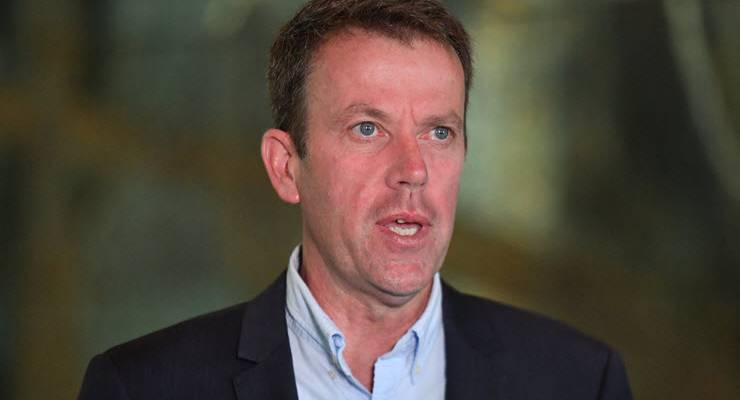
Hear the one about the trade deal that came down to the wire?
According to Trade Minister Dan Tehan, the trade deal with a post-Brexit UK is going “down to the wire”. The phrase might ring a bell with people with a memory longer than five minutes. The Trans Pacific Partnership deal went down to the wire in 2015. The hearts of trade negotiators back then had barely recovered from the time the trade deal with China went down to the wire in 2014. Veterans might have recalled that the trade deal with the United States went down to the wire in 2003.
None of that augurs well for this trade agreement with the Brits.
The TPP, negotiated in secret, was abandoned by the Americans in 2016 — both Donald Trump and Hillary Clinton ended up opposing it. The leftover countries then cobbled together a US-less version.
The Department of Foreign Affairs and Trade was always reluctant to spell out exactly what the benefits were, with or without the US, and eventually conjured up a figure of total national benefits of $150,000. A World Bank study found it would increase Australian GDP by 0.7% by 2030 (cumulative, not annually) — although at least that was more than the wholly trivial benefits an American report found.
As for the trade deal with China, that was negotiated back when the Coalition was wholly pro-China and any criticism of the deal was dismissed as racist. The deal turned out to be worthless the moment China decided that honouring it was no longer in its interests, and Australian business thought the deal at best was irrelevant to them.
As for the AUSFTA, the Productivity Commission — long a sceptic of trade deals, no matter which side is in power, and keen to prick the hype that surrounds governments’ announcements of them — was unable to find any evidence of benefits from the deal when it produced its landmark report on trade deals in 2010, beyond noting that it imposed a “net cost” on Australia in its IT provision. But since then hard evidence has emerged that it has been economically damaging for Australia (Australia’s trade deficit with the US has also dramatically increased in the past 15 years).
So here’s some prediction on the UK-Australia trade deal:
- Despite going “down to the wire” it will be signed, either in a few days or at some point in coming weeks, for the political benefit of both governments
- Despite the name, it will not be a “free trade” deal, but simply a “managed trade” deal. There will be very little “free trade” involved
- It will be announced with great fanfare and we will be assured that huge benefits will flow to Australian business from it — at the same time as Brits are being assured they too will be huge winners
- Actual rigorous analysis will never appear as part of the announcement and if it does at some point in the administrative implementation of the deal, it will show trivial benefits at best
- No one will particularly benefit from the deal and it will be forgotten after a couple of years until academic research or the Productivity Commission in a few years reveals that either it imposed a net cost on the economy or delivered nothing of any note
- Little of any of the above will be reported in the media.
And one more prediction: no one outside the Productivity Commission will point out that if we got rid of all our trade barriers unilaterally, we’d get far more benefit and have far more jobs than will be delivered by any trade deal.








Free Trade Agreement (FTA)? Shouldn’t it be called the ‘F*** All’ Trade Agreement (FATA). Apologies for my reference to the F word but how else could any rational person describe this nonsense?
It’s similar to the ‘cook the books’ benefits that supposedly flow from government subsidies to the Grand Prix, making films in Australia etc. The benefits are illusory and the Australian worker is taken for a ride on nearly every occasion. The risk of decision making being wrenched from Australia to an arcane, invariably stacked, hostile, ‘appeal board’ is real. These are definitely not free trade deals. Australia has been suckered every time as other countries honour them in the breach. We are repeatedly shown to be babes in the woods when negotiating with more powerful, cynical, exploitative nations.
Best short article I’ve read on this topic.
Why are they called “Free Trade Deals”? There is no such thing.
Why are they always so secretive? Is it because the Public would see through the associated hype.
There is also the problem of ISDS clauses which allow companies to sue governments which change any law of policy under which the company claims it may have benefitted. Best example is of the Australian government being sued by Philip Morris after the passage of the law on the plain packaging of cigarettes. Government won eventually but its legal costs in defending the policy amounted to $39,000,000.
Everything else is largely smoke and mirrors. The ISDS provisions are our sovereign government signing over their sovereignty. There should be a law against any agreements that include ISDS provisions.
Yes, how does giving away/abolishing the nation’s sovereignty not count as treason – the crime of betraying one’s country, especially by attempting to overthrow the sovereign or government?
Yes. looked up ISDS on Google – absolutely horrific economic penalties to nations. Brought to court by corporations. Where is the democracy in this law/regulation? Who invented and implemented this scourge? And as I tend to ask more often nowadays “who actually benefits the most”?
To put it more crudely, ‘who is screwing whom and how does it benefit the screwed?’
“Dud Deals ‘R Us.” It’s all for domestic PR consumption.
Boris Johnson’s domestic PR consumption.